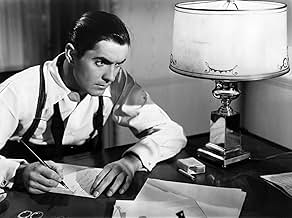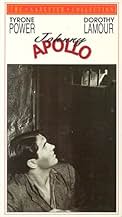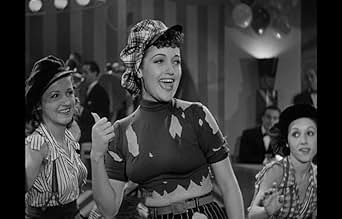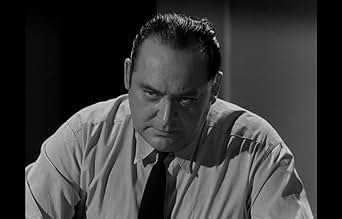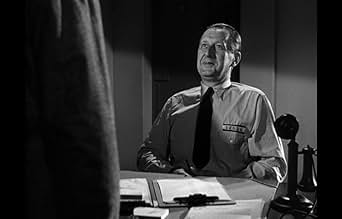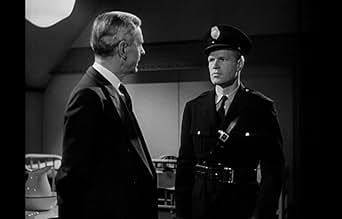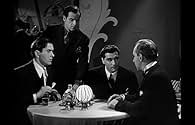VALUTAZIONE IMDb
6,9/10
1624
LA TUA VALUTAZIONE
Aggiungi una trama nella tua linguaThe son of a jailed Wall Street broker turns to crime to pay for his father's release.The son of a jailed Wall Street broker turns to crime to pay for his father's release.The son of a jailed Wall Street broker turns to crime to pay for his father's release.
- Regia
- Sceneggiatura
- Star
- Premi
- 2 vittorie totali
Selmer Jackson
- Warden
- (as Selmar Jackson)
Gary Breckner
- Announcer
- (voce)
Recensioni in evidenza
"Johnny Apollo" is a better than average film for 1940, and it's worth watching if for no other reason than a four-minute segment in which sultry Dorothy Lamour, all dark eyes and pouty lips, sings "This Is the Beginning of the End" in a stunning, torchy alto. The song was a 1952 hit for singer Don Cornell, but his version pales beside Lamour's soulful rendition here. Her role as "Lucky" completely trumps her best known role as a foil for Hope & Crosby in the Road pictures. I have a whole new respect for her now as a singer, an artist and a sex symbol.
Sometimes it's best with some films to turn off your brain and just enjoy. You can't think through the plot too much or your head might just explode! This is exactly the sort of film JOHNNY APOLLO is--very entertaining and fun but also with a plot that strains credibility way beyond the breaking point.
The film begins with Edward Arnold being arrested for stock fraud. Suddenly, his millions are gone and his son (Tyrone Power) must leave school and fend for himself. In a very odd scene between the two before Arnold is sent to prison, Tyrone expresses disappointment in his father and Arnold responds by disowning him! Considering everything that Arnold had done, his sanctimonious response was perplexing. Despite being disowned, Power did still care about his father. However, he was also shocked to see that Dad's reputation ruined his chance to get a job--as everyone held this against him. Then, after changing his name, his only employer fired him because he DIDN'T acknowledge Arnold as his father! Sometimes you just can't win.
Now, without a job AND wanting to earn enough money to hire a shyster lawyer to file an appeal (as responsible ones won't), Tyrone approaches a drunken lawyer who has a history of playing fast and loose with the truth. In the process, he comes to know a notorious hood (Lloyd Nolan) and is soon hired--and he's now on the fast track to be able to afford the lawyer and to "grease the right palms" to get Arnold sprung from jail. Oddly, however, they never really show or talk about Power doing anything especially illegal!
Soon after beginning work with Nolan, Power has a reconciliation with Dad when he visits the prison. However, when Arnold learns that his son is working for the underworld, he vows, once again, to have nothing to do with Power. Again, this makes little sense. The first time, he disowns him for not being for accepting of his evil ways and now that Power, too, is a crook the father can't accept him once again! There's a lot more to the plot than this and Power even eventually is imprisoned in the same place as his dad!
Along for the ride is Dorothy Lamour as a lounge singer with a heart of gold and Charlie Grapewin (in one of his best roles) as the crooked attorney. All in all the acting (especially Nolan and Arnold) is very good and the film has so many plot elements and twists that it is a decent example of early Film Noir. Entertaining and impossibly improbable--plus it really is a bit hard to believe Power as a mobster.
The film begins with Edward Arnold being arrested for stock fraud. Suddenly, his millions are gone and his son (Tyrone Power) must leave school and fend for himself. In a very odd scene between the two before Arnold is sent to prison, Tyrone expresses disappointment in his father and Arnold responds by disowning him! Considering everything that Arnold had done, his sanctimonious response was perplexing. Despite being disowned, Power did still care about his father. However, he was also shocked to see that Dad's reputation ruined his chance to get a job--as everyone held this against him. Then, after changing his name, his only employer fired him because he DIDN'T acknowledge Arnold as his father! Sometimes you just can't win.
Now, without a job AND wanting to earn enough money to hire a shyster lawyer to file an appeal (as responsible ones won't), Tyrone approaches a drunken lawyer who has a history of playing fast and loose with the truth. In the process, he comes to know a notorious hood (Lloyd Nolan) and is soon hired--and he's now on the fast track to be able to afford the lawyer and to "grease the right palms" to get Arnold sprung from jail. Oddly, however, they never really show or talk about Power doing anything especially illegal!
Soon after beginning work with Nolan, Power has a reconciliation with Dad when he visits the prison. However, when Arnold learns that his son is working for the underworld, he vows, once again, to have nothing to do with Power. Again, this makes little sense. The first time, he disowns him for not being for accepting of his evil ways and now that Power, too, is a crook the father can't accept him once again! There's a lot more to the plot than this and Power even eventually is imprisoned in the same place as his dad!
Along for the ride is Dorothy Lamour as a lounge singer with a heart of gold and Charlie Grapewin (in one of his best roles) as the crooked attorney. All in all the acting (especially Nolan and Arnold) is very good and the film has so many plot elements and twists that it is a decent example of early Film Noir. Entertaining and impossibly improbable--plus it really is a bit hard to believe Power as a mobster.
While not a classic for the ages, this pre-noir gangster adventure is an excellent example of the studio product churned out in a short time to top a two-film bill at your local theatre in the 1940's, and one of the things that makes it great fun for committed film fans is the use of familiar faces to back up Tyrone Power, playing a rich kid turned bad boy, and Dorothy Lamour, who surprises us by offering a good deal more in the acting department than in the Crosby-Hope Road films, where she functioned primarily as tropical window dressing.
One fascinating performance is offered by the underused Charlie Grapewin, perhaps known to the average film goer as Uncle Henry in The Wizard of Oz, or as Grandpa in Grapes of Wrath (Grapewins's most sympathetic and memorable role is as burned-out Jeeter Lester in Jonh Ford's misunderstood Tobacco Road). In Johhny Apollo, Grapewin's take on the burned-out lawyer who takes milk with his Scotch and mumbles Shakespeare when to evade confrontation is both funny and endearing and he becomes a pivotal plot element as the plot thickens.
And thicken it does, with lusty Edward Arnold tossed into jail for embezzlement, and his disowned son, Power, taking up with gangster Lloyd Nolan (always reliable, but here essayed with a nasty undercurrent); much of what Nolan's brutal ganglord does adds a noir element to the film,and a brief scene in a steam bath is right out of Sam Fuller.
Add thug Marc Lawrence from Broadway, Jonathan Hale, reliably a doctor, Fuzzy Knight as a nervous prisoner, and from the Son of Frankenstein, Lionel Atwill, cold and calculating as the lawyer without ethics--until money is dangled his way. The pace never flags, and, except for a short and absurd tagged-on ending that Zanuck probably demanded on behalf of Power fans, the film builds to a dynamic shoot-out in a prison. Not a great classic, but a perfect example of 20th Century Fox machine making a film worth watching.
One fascinating performance is offered by the underused Charlie Grapewin, perhaps known to the average film goer as Uncle Henry in The Wizard of Oz, or as Grandpa in Grapes of Wrath (Grapewins's most sympathetic and memorable role is as burned-out Jeeter Lester in Jonh Ford's misunderstood Tobacco Road). In Johhny Apollo, Grapewin's take on the burned-out lawyer who takes milk with his Scotch and mumbles Shakespeare when to evade confrontation is both funny and endearing and he becomes a pivotal plot element as the plot thickens.
And thicken it does, with lusty Edward Arnold tossed into jail for embezzlement, and his disowned son, Power, taking up with gangster Lloyd Nolan (always reliable, but here essayed with a nasty undercurrent); much of what Nolan's brutal ganglord does adds a noir element to the film,and a brief scene in a steam bath is right out of Sam Fuller.
Add thug Marc Lawrence from Broadway, Jonathan Hale, reliably a doctor, Fuzzy Knight as a nervous prisoner, and from the Son of Frankenstein, Lionel Atwill, cold and calculating as the lawyer without ethics--until money is dangled his way. The pace never flags, and, except for a short and absurd tagged-on ending that Zanuck probably demanded on behalf of Power fans, the film builds to a dynamic shoot-out in a prison. Not a great classic, but a perfect example of 20th Century Fox machine making a film worth watching.
Johnny Apollo was Darryl F. Zanuck's attempt probably at Tyrone Power's request to give him some more challenging material. Up to this time Power's films were mostly either costume period dramas or screen comedies. For the first time Ty is in modern dress and in a drama.
Power fits the title role of Johnny Apollo rather well. The name is a spur of the moment creation for Robert Cain, Jr. who would be called a trust fund baby today. His widower father Edward Arnold's indictment for some white collar securities violations has put Power's rather well ordered and soft universe to a sudden end.
Power tries to play it straight, but can't make a go of it. Circumstances put him and gangster Lloyd Nolan together. And Power discovers he's got a talent for the rackets. He also attracts the attention of Nolan's girl friend Dorothy Lamour.
Johnny Apollo is a good film with crackerjack performances by the cast that Henry Hathaway directed. It's probably best compared to MGM's Johnny Eager where Louis B. Mayer was also trying to broaden their studio's heartthrob Robert Taylor's appeal. Johnny Eager is the better film, but no one in Johnny Apollo need be ashamed of anything.
Best performances in the film are from Nolan as gangster Mickey Dwyer. Nolan was never bad in any film he was ever in. Second best is alcoholic mob attorney Charley Grapewin.
Dorothy Lamour was brought over from Paramount for this film, playing a part that Alice Faye or Betty Grable might normally have been assigned to. She gets two of her best movie songs to sing, This Is The Beginning Of The End by Mack Gordon and Your Kiss by Frank Loesser and Lionel Newman.
Johnny Apollo is a fine gangster film from a studio that normally did not do that particular genre. At least at this time.
Power fits the title role of Johnny Apollo rather well. The name is a spur of the moment creation for Robert Cain, Jr. who would be called a trust fund baby today. His widower father Edward Arnold's indictment for some white collar securities violations has put Power's rather well ordered and soft universe to a sudden end.
Power tries to play it straight, but can't make a go of it. Circumstances put him and gangster Lloyd Nolan together. And Power discovers he's got a talent for the rackets. He also attracts the attention of Nolan's girl friend Dorothy Lamour.
Johnny Apollo is a good film with crackerjack performances by the cast that Henry Hathaway directed. It's probably best compared to MGM's Johnny Eager where Louis B. Mayer was also trying to broaden their studio's heartthrob Robert Taylor's appeal. Johnny Eager is the better film, but no one in Johnny Apollo need be ashamed of anything.
Best performances in the film are from Nolan as gangster Mickey Dwyer. Nolan was never bad in any film he was ever in. Second best is alcoholic mob attorney Charley Grapewin.
Dorothy Lamour was brought over from Paramount for this film, playing a part that Alice Faye or Betty Grable might normally have been assigned to. She gets two of her best movie songs to sing, This Is The Beginning Of The End by Mack Gordon and Your Kiss by Frank Loesser and Lionel Newman.
Johnny Apollo is a fine gangster film from a studio that normally did not do that particular genre. At least at this time.
Wall Street millionaire Edward Arnold (as Robert Cain Sr.) is indicted for embezzlement and goes directly to jail. Canoeing in his swim trunks, college student son Tyrone Power (as Robert "Bob" Cain Jr.) is shocked and disappointed. He disowns his dad and drops out of school. Now a convict's son, Mr. Power finds himself unable to find honest work. While waiting to see alcoholic lawyer Charley Grapewin (as Emmett T. Brennan), Power meets attractive Dorothy Lamour (as "Lucky" Dubarry) and paroled gangster Lloyd Nolan (as Mickey "The Mick" Dwyer). Power assumes the name "Johnny Apollo" and drifts into a life of crime...
This story is too loosely plotted, but not in a way that makes it difficult to follow...
Helping immensely is that the film is great looking, and directed exceptionally by Henry Hathaway. The black-and-white cinematography is especially noteworthy; photographer Arthur Miller might have received his annual "Academy Award" nomination for this one, if the studio wasn't backing him in "The Blue Bird" (1940). Then Fox' biggest star, Power shows he might have accomplished the same feat at MGM or Warner Bros. Singing and "Dancing for Nickels and Dimes", Ms. Lamour is luscious, especially in a leggy skirt and clinging top. Dependable supporting actors like Mr. Nolan and Mr. Grapewin get juicy parts, too.
******* Johnny Apollo (3/15/40) Henry Hathaway ~ Tyrone Power, Dorothy Lamour, Lloyd Nolan, Edward Arnold
This story is too loosely plotted, but not in a way that makes it difficult to follow...
Helping immensely is that the film is great looking, and directed exceptionally by Henry Hathaway. The black-and-white cinematography is especially noteworthy; photographer Arthur Miller might have received his annual "Academy Award" nomination for this one, if the studio wasn't backing him in "The Blue Bird" (1940). Then Fox' biggest star, Power shows he might have accomplished the same feat at MGM or Warner Bros. Singing and "Dancing for Nickels and Dimes", Ms. Lamour is luscious, especially in a leggy skirt and clinging top. Dependable supporting actors like Mr. Nolan and Mr. Grapewin get juicy parts, too.
******* Johnny Apollo (3/15/40) Henry Hathaway ~ Tyrone Power, Dorothy Lamour, Lloyd Nolan, Edward Arnold
Lo sapevi?
- QuizIn the scene with Johnny and his father talking in the bedroom, the photo over Johnny's shoulder of his mother, is a picture of Tyrone Power's mother.
- BlooperWhen Mickey comes into the judge's offices after the judge has smashed the two whisky bottles, he comments that the room smells like a brewery. It is more likely that the room would smell like a distillery rather than a brewery and Mickey would be aware of the difference.
- Citazioni
Prisoner Tom Dugan: I steal an empty slot machine and get 10 years, and this guy steals a million and gets 5. Figure that out, will yuh?
Main Reporter: [Sarcastically] That's why you got the 10 - to figure it out.
- ConnessioniFeatured in Mai dire sì: Cast in Steele (1984)
- Colonne sonoreThis Is the Beginning of the End
(1940)
Written by Mack Gordon
Performed by Dorothy Lamour (uncredited) with Harry Rosenthal (uncredited) at piano
Played as background music often
I più visti
Accedi per valutare e creare un elenco di titoli salvati per ottenere consigli personalizzati
- How long is Johnny Apollo?Powered by Alexa
Dettagli
- Data di uscita
- Paese di origine
- Lingua
- Celebre anche come
- Johnny Apollo
- Luoghi delle riprese
- Sing Sing Penitentiary - 354 Hunter Street, Ossining, New York, Stati Uniti(exteriors: prison)
- Azienda produttrice
- Vedi altri crediti dell’azienda su IMDbPro
- Tempo di esecuzione1 ora 34 minuti
- Colore
- Proporzioni
- 1.37 : 1
Contribuisci a questa pagina
Suggerisci una modifica o aggiungi i contenuti mancanti

Divario superiore
By what name was Il prigioniero (1940) officially released in India in English?
Rispondi
